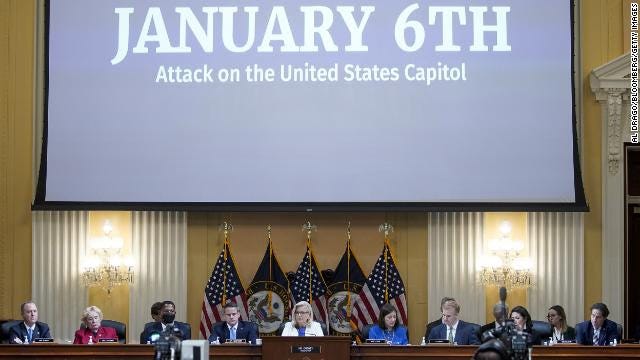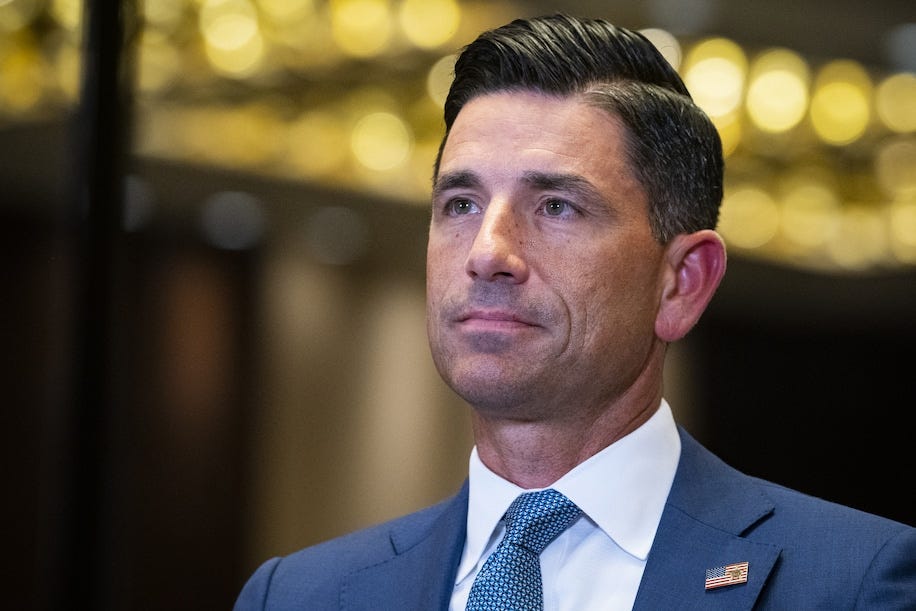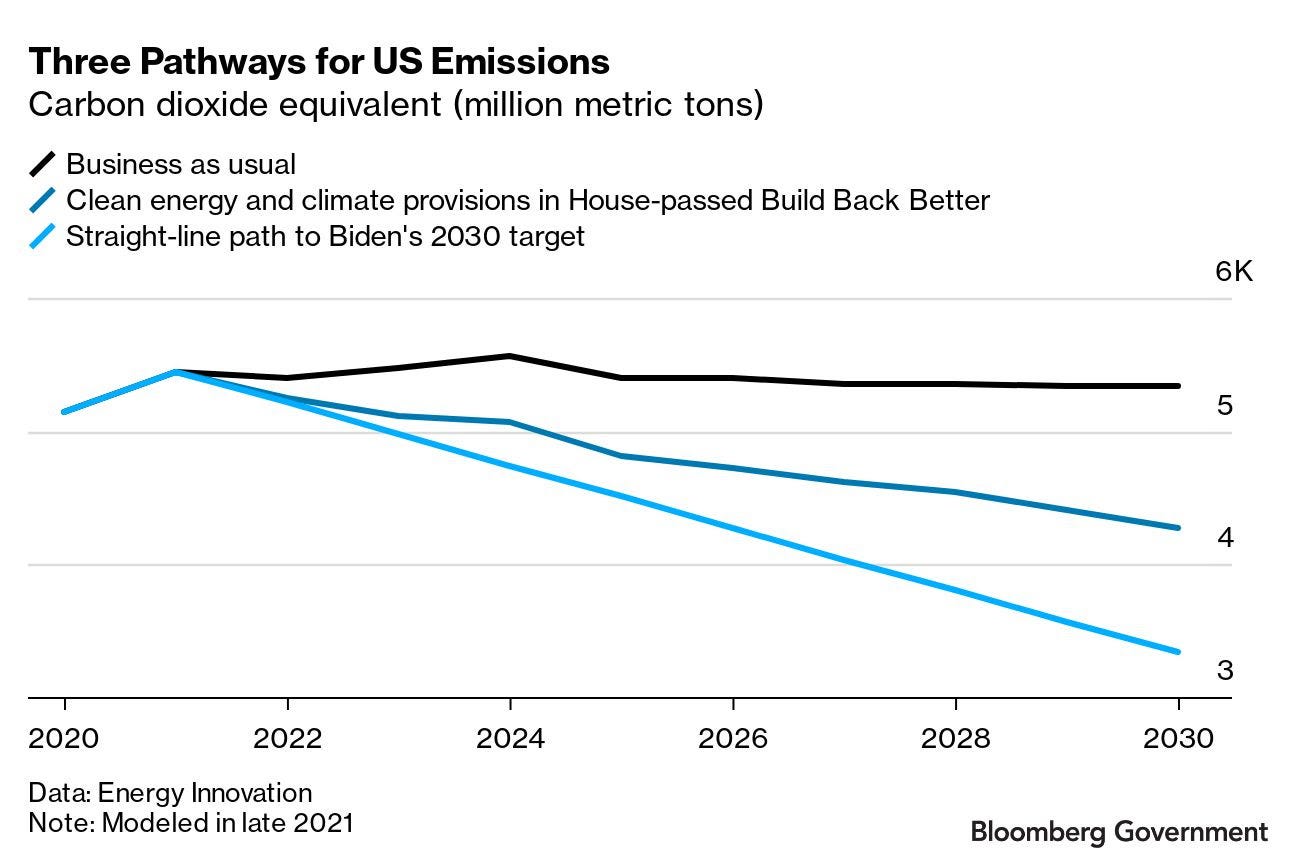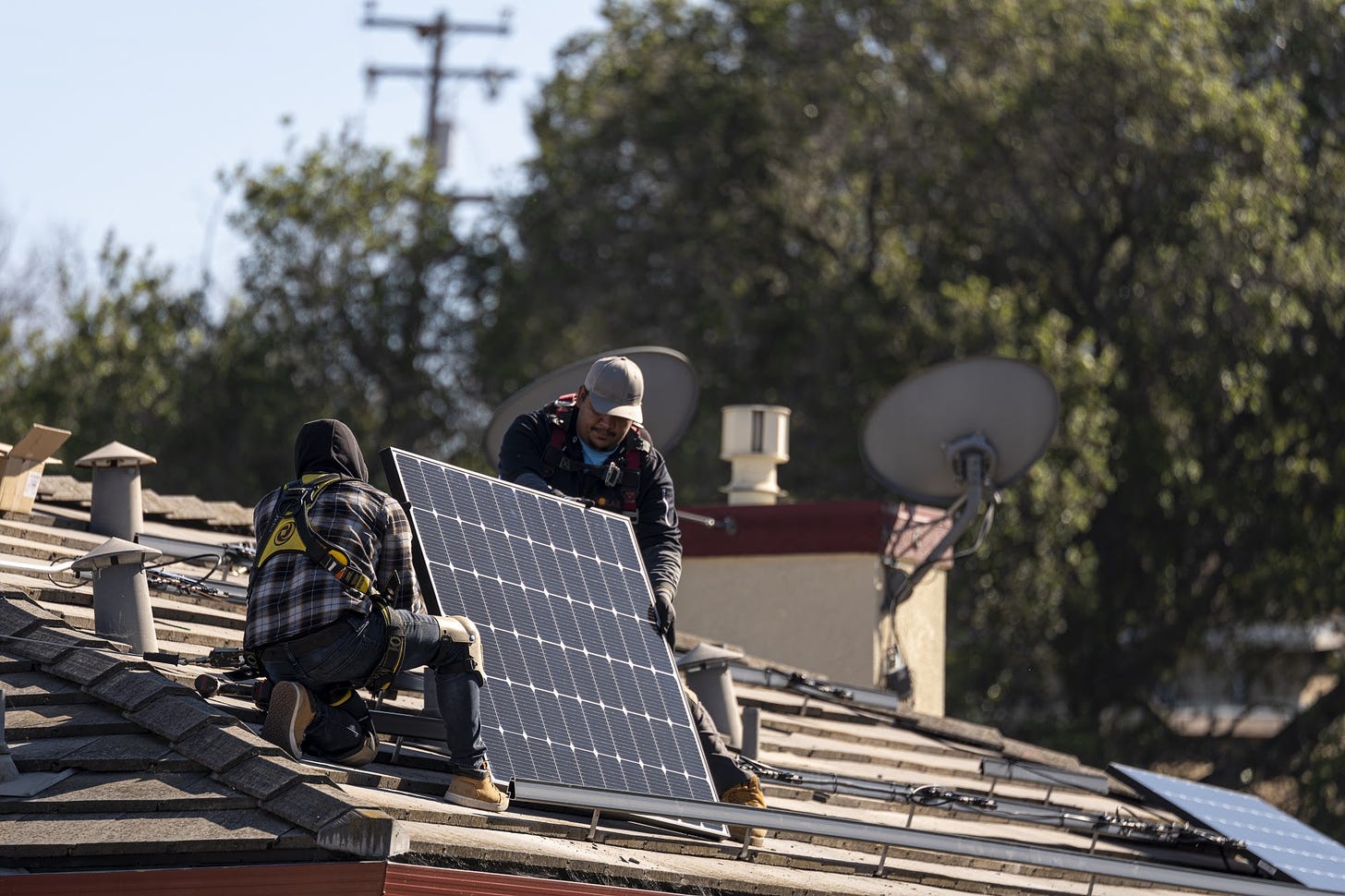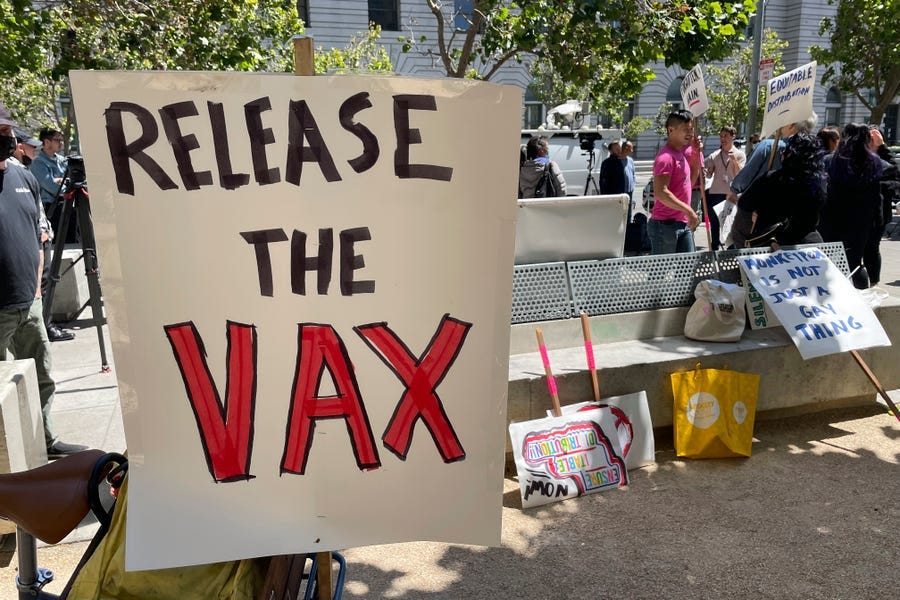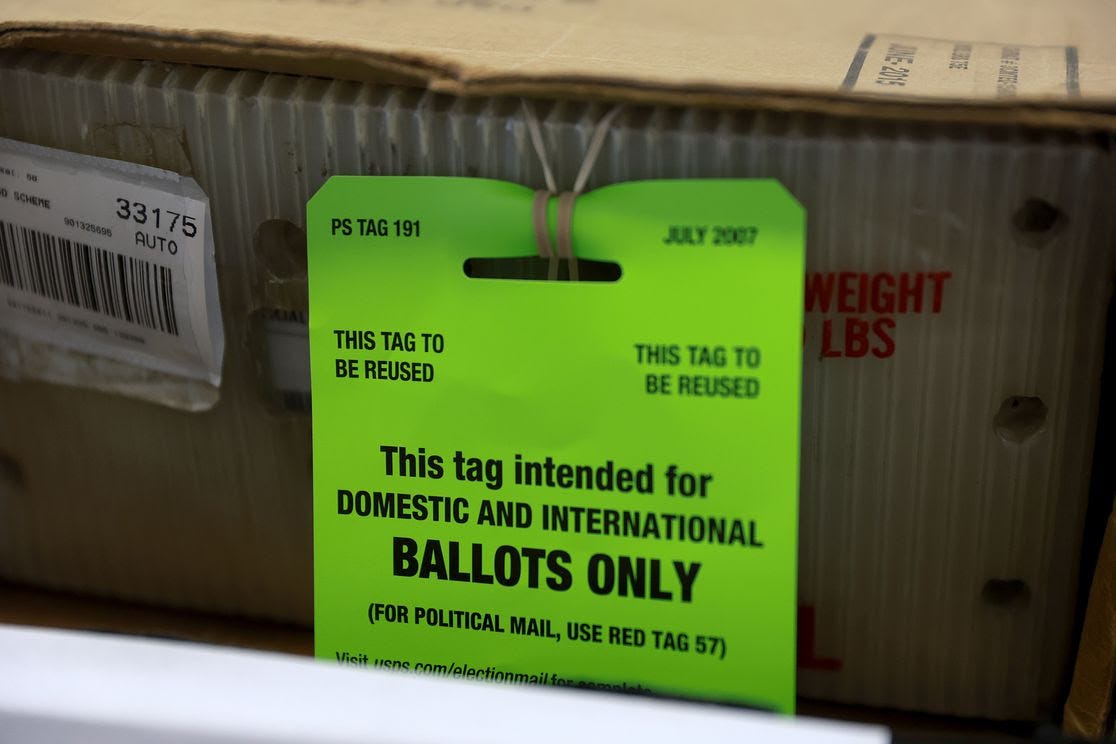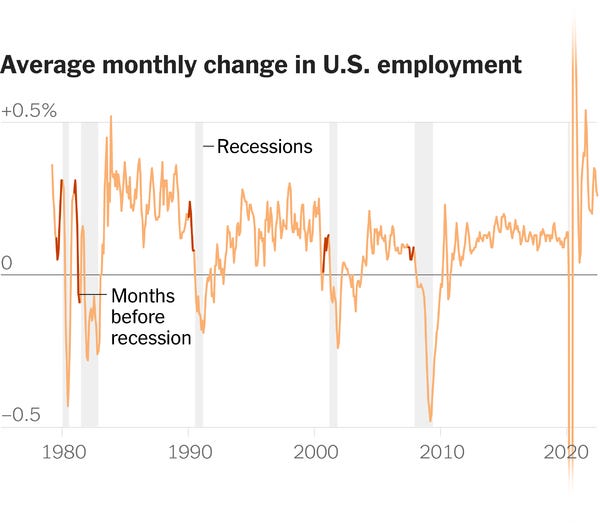The Full Belmonte, 7/29/2022
“The Justice Department's criminal investigation into the January 6 Capitol riot is heating up. According to sources familiar with the matter, prosecutors are preparing for a court battle to force former White House officials to testify about former President Donald Trump's conversations and actions around the insurrection. This appears to be the clearest sign yet that federal investigators are homing in on Trump's conduct as he tried to prevent the transfer of power to Joe Biden. This court fight would put the Justice Department's investigation into a more aggressive stance than even the Mueller investigation -- a major yearslong criminal probe into Trump while he was President. He was not ultimately charged. This comes as the House select committee investigating the Capitol riot confirmed it intends to share 20 transcripts with the DOJ as the department ramps up its investigation.” Read more at CNN
“Text messages for former President Donald Trump’s acting Homeland Security Secretary Chad Wolf and acting deputy secretary Ken Cuccinelli are missing for a key period leading up to the Jan. 6 attack on the Capitol, according to four people briefed on the matter and internal emails.
This discovery of missing records for the senior-most homeland security officials, which has not been previously reported, increases the volume of potential evidence that has vanished regarding the time around the Capitol attack.
It comes as both congressional and criminal investigators at the Department of Justice seek to piece together an effort by the president and his allies to overturn the results of the election, which culminated in a pro-Trump rally that became a violent riot in the halls of Congress.
The Department of Homeland Security notified the agency’s inspector general in late February that Wolf’'s and Cuccinelli’s texts were lost in a “reset” of their government phones when they left their jobs in January 2021 in preparation for the new Biden administration, according to an internal record obtained by the Project on Government Oversight and shared with The Washington Post.
The office of the department’s undersecretary of management also told the government watchdog that the text messages for its boss, undersecretary Randolph ‘Tex’ Alles, the former Secret Service director, were also no longer available due to a previously planned phone reset.
The office of Inspector General Joseph V. Cuffari did not press the department leadership at that time to explain why they did not preserve these records, nor seek ways to recover the lost data, according to the four people briefed on the watchdog’s actions. Cuffari also failed to alert Congress to the potential destruction of government records.
The revelation comes on the heels of the discovery that text messages of Secret Service agents — critical firsthand witnesses to the events leading up to Jan. 6 — were deleted more than a year ago and may never be recovered.
The news of their missing records set off a firestorm because the texts could have corroborated the account of a former White House aide describing the president’s state of mind on January 6. In one case, the aide, Cassidy Hutchinson said a top official told her that Trump had tried to attack a senior Secret Service agent who refused to take the president to the Capitol with his supporters marching there.
In a nearly identical scenario to that of the DHS leaders’ texts, the Secret Service alerted Cuffari’s office seven months ago, in December 2021, that the agency had deleted thousands of agents’ and employees’ text messages in an agency-wide reset of government phones. Cuffari’s office did not notify Congress until mid-July, despite multiple congressional committees’ pending requests for these records.
The telephone and text communications of Wolf and Cuccinelli in the days leading up to Jan. 6 could have shed considerable light on Trump’s actions and plans. In the weeks before the attack on the Capitol, Trump had been pressuring both men to help him claim the 2020 election results were rigged and even to seize voting machines in key swing states to try to ‘re-run’ the election.” Read more at Washington Post
© Associated Press / Susan Walsh | President Biden during a meeting with CEOs at the White House on Thursday.
“The US economy shrank again in the second quarter, the Bureau of Economic Analysis said Thursday, fueling some recession fears. Gross domestic product, or GDP, fell by 0.9% on an annualized basis from April through June. The decline marks a key symbolic threshold for the most commonly used -- though unofficial -- definition of a recession as two consecutive quarters of negative economic growth. Although Thursday's estimate marked a sharp drop from the 6.7% expansion the economy underwent in the second quarter of 2021, the Biden administration has been adamant that the world's largest economy, despite being buffeted by decades-high inflation, remains fundamentally sound.”d more at CNN
"As details of the tax, climate, and health-care pact agreed by Democrats in the US Senate emerge, one thing is clear: It’s a big deal.
If approved, it should cast doubt on the narrative of a Democratic Party too riven by ideological differences to govern. But with economic concerns grabbing the spotlight, the question is whether that will make any difference in November midterm election fight for control of Congress.
Key reading:
Manchin-Schumer Shock Deal Began in Basement, Unfolded in Secret
Senate Deal Puts US Back in Climate Fight With ‘Huge’ CO2 Cuts
Manchin Wins Big Nods to Oil in Deal Ending Logjam on Climate
Here’s What’s in Democrats’ $370 Billion Climate Spending Deal
Senate Tax, Climate, Drugs Bill in Limbo as Sinema Reviews Text
‘Technical Recession’ Sets Up War of Words as US Voters Suffer
The $370 billion climate and energy spending package and $313 billion in corporate-tax increases would complement last year’s $1.2 trillion infrastructure law and a $52 billion bill to boost the US semiconductor industry.
It would lower eye-watering prices for drugs like insulin and envisions a 15% minimum tax on corporations and abolishing a workaround that billionaire fund managers use to avoid paying the same rates as average workers.
The bill would also put the US within striking distance of meeting President Joe Biden’s goal of cutting emissions by half by 2030, even if it may open the way to holding oil and gas lease sales that could undercut the climate-friendly focus.
Obstacles remain. Arizona Democratic Senator Kyrsten Sinema — a repeat spoiler of the party’s legislation — has long opposed closing the so-called ‘carried-interest’ loophole that the bill targets. Her vote is vital.
And the Democrats still face economic challenges.
Despite roaring employment and consumer spending, the economy contracted for the second time in as many quarters from April to June. Inflation is the worst since the 1980s, the stock market is stumbling, and borrowing costs are rising.
Unfortunately for Democrats, when elections come, the bills voters are more likely to focus on are the ones they have to pay, rather than those hashed out in Congress.” — Michael Winfrey Read more at Bloomberg
Workers install solar panels in Hayward, California, on Feb. 8. The deal agreed by Senate Democrats offers incentives to increase the production of energy from renewable sources. Photographer: David Paul Morris/Bloomberg
“More rain is expected in Kentucky after heavy downpours caused massive flooding across the eastern part of the state , leaving at least eight people dead Thursday. Kentucky Gov. Andy Beshear asked for prayers. ‘In a word, this event is devastating,’ Beshear said. ‘And I do believe it will end up being one of the most significant, deadly floods that we have had in Kentucky in at least a very long time.’ He said property damage has been massive, with hundreds losing their homes. The National Weather Service said additional flooding was possible into Friday in much of West Virginia, eastern Kentucky and southwest Virginia.” Read more at USA Today
Members of a rescue team assist a family out of a boat on July 28, 2022 in Quicksand, Kentucky.Michael Swensen, Getty Images
“The principal of Robb Elementary School in Uvalde, Texas, has been allowed to return to work after a brief suspension, according to her attorney. Mandy Gutierrez has faced criticism about her handling of school security before the mass shooting that left 19 children and two teachers dead. She was placed on administrative leave Monday during a school board meeting. Gutierrez's reinstatement comes after an exclusive interview with CNN this week in which she defended her actions during the May 24 shooting. ‘I feel that I followed the training that I was provided with to the best of my abilities,’ she said when asked whether she felt she should lose her job. ‘And I will second-guess myself for the rest of my life.’” Read more at CNN
“The Biden administration announced that more than 780,000 doses of monkeypox vaccines will be available Friday, as the rapidly spreading outbreak continues to raise concern. These doses will add to the 300,000 doses distributed this month, bringing the total to 1.1 million. The mayor of San Francisco announced a state of emergency Thursday over the growing number of monkeypox cases, allowing officials to cut through red tape. The city has 281 cases, out of about 800 in California and 4,600 nationwide, according to the San Francisco Department of Public Health. As of Wednesday, over 20,000 cases of monkeypox had been detected globally in 77 countries, the CDC's Jennifer McQuiston said.
Addressing myths about monkeypox: A look at symptoms, treatment and other common questions.” Read more at USA Today
A sign urges the release of the monkeypox vaccine during a protest in San Francisco, July 18, 2022.Haven Daley, AP
“An impassioned plea from a 12-year-old girl has gone viral after she spoke to West Virginia Republican lawmakers during a public hearing for an abortion bill that would prohibit the procedure in nearly all cases.
On Wednesday, Addison Gardner of Buffalo middle school in Kenova, West Virginia, was among several people who spoke out against a bill that would not only ban abortions in most cases but also allow for physicians who perform abortions to be prosecuted.
Addressing the West Virginia house of delegates, Gardner, among about 90 other speakers, was given 45 seconds to plead her case.
‘My education is very important to me and I plan on doing great things in life. If a man decides that I’m an object and does unspeakable and tragic things to me, am I, a child, supposed to carry and birth another child?’ Gardner said.
She went on to add, ‘Am I to put my body through the physical trauma of pregnancy? Am I to suffer the mental implications, a child, who had no say in what was being done with my body? Some here say they are pro-life. What about my life? Does my life not matter to you?’
As Gardner – a volleyball and track athlete at her middle school, spoke, she was looked on by Rita Ray, an 80-year-old woman who had an abortion in 1959, 14 years before terminations were deemed a constitutional right.
In a photo captured by Kyle Vass, a journalist from the American Civil Liberties Union of West Virginia, Ray can be seen smiling in the background as Gardner issued her impassioned plea.
One user who tweeted the photo wrote, ‘Rita Ray, 80, who risked her life pre-Roe by getting an abortion from someone who wasn’t a healthcare provider, watches on as Addison Gardner, 12, contemplates her own future without access to legal abortion in WV.’
Despite speeches from Gardner and other abortion rights activists, the house passed the bill by an overwhelming vote of 69 to 23. Shortly after Gardner delivered her address, house members adopted an amendment that would allow abortions in cases of rape or incest.
However, the amendment, which passed narrowly with 46 to 43 votes, only allows for the procedure to be performed up to 14 weeks of pregnancy and only if the rape or incest is reported to the police.
Unlike some other states which have ‘trigger bans’ that would ban abortions within 30 days of Roe being overturned, West Virginia has a 150-year-old pre-Roe abortion ban that would come back into effect in the absence of Roe.
Last week, Kanawha county circuit judge Tera Salango blocked the enforcement of the abortion ban and granted the Women’s Health Center of West Virginia, the state’s only abortion clinic, the ability to continue performing the procedure.
Salango said its patients, ‘especially those who are impregnated as a result of a rape or incest, are suffering irreparable harm’, the Associated Press reports.
West Virginia’s attorney general, Patrick Morrisey, described the ruling as ‘a dark day for West Virginia’.
The abortion bill moved to the West Virginia senate on Thursday and may be passed by the end of the week.” Read more at The Guardian
‘When I originally put out this fundraiser, I was hoping we would raise a few thousand dollars,’ Olivia Julianna, shown here in late June, said in a statement. ‘This movement … has truly left me in awe.’ (Callaghan O’Hare for The Washington Post)
“Olivia Julianna, the 19-year-old reproductive rights activist who this week turned an insult from Rep. Matt Gaetz (R-Fla.) into a fundraiser, has raised more than $1.3 million for women seeking abortions — after taking just 72 hours to hit the $1 million mark.
The donations inspired by Olivia Julianna, a political strategist for the nonprofit Gen Z for Change, happily surprised abortion rights advocates. The $1.3 million raised by the group by early Friday is more than 10 percent of what the National Network of Abortion Funds — which includes about 90 abortion funds in the United States and Mexico — distributed in an entire year. It is also enough to fund thousands of abortions, which cost on average $550 per service.
This means ‘that a bunch of people who would simply have not gotten their abortions now will,’ said Liza Fuentes, a senior research scientist at the Guttmacher Institute in New York who has studied reproductive health care for 16 years.
Olivia Julianna, who uses only her first and middle names due toprivacy concerns, launched the fundraiser after an online exchange with Gaetz. When she criticized Gaetz for calling abortion rights activists ‘disgusting’ and overweight at a political rally last week, the congressman shot back, posting her photo on Twitter next to a link to a news story that mentioned his insults.
Gaetz’s tweet has been shared hundreds of times and has triggered online attacks against Olivia Julianna. When reached for comment about his tweet and the ensuing fundraiser, a spokesman for Gaetz said only that no amount of solicitation would change the United States’ new status as a ‘pro-life nation’ after Roe v. Wade was overturned last month.
Meanwhile, the donations are continuing to roll in, and the hashtag ‘#ThanksMattGaetz’ was trending on Twitter.” Read more at Washington Post
Carts of vote-by-mail ballots sit in a Postal Service truck at the Miami-Dade Election Department headquarters last week. Photo: Joe Raedle/Getty Images
“The Postal Service is creating a division to handle election mail issues, with local ‘election mail strike teams,’ AP reports.
Why it matters: Election and Government Mail Services will be a permanent division dedicated to dealing with election matters — which in the past have been handled one at a time.” Read more at Axios
“Supreme Court Justice Clarence Thomas won't return to teaching a constitutional law seminar at George Washington University after student protests over the Supreme Court's vote to overturn Roe v. Wade.” Read more at NPR
“Who is Victor Bout, the Russian serving a 25-year prison sentence in Illinoiswho may be freed as part of a U.S.-Russia prisoner swap? Bout was the world's most notorious arms dealer in the 1990s and early 2000s, earning the nickname ‘The Merchant of Death.’ He could also be the key to bringing Americans Brittney Griner and Paul Whelan home.” Read more at NPR
Taiwanese soldiers used these amphibious assault vehicles yesterday during a drill simulating an invasion by China. Photo: Annabelle Chih/Getty Images
“The timeline for a potential Chinese attempt to take Taiwan by force seems to be getting shorter, Axios' Bethany Allen-Ebrahimian reports from Taipei, with Dave Lawler in Washington.
Chinese President Xi Jinping warned President Biden not to ‘play with fire’ over Taiwan yesterday, according to the Chinese readout of a call between the two leaders.
That contentious exchange comes with Beijing threatening ‘serious consequences’ if House Speaker Pelosi follows through on a planned visit to the self-governing island.
Why it matters: Fears are rising in the West Wing that Taiwan could become a military flashpoint sooner rather than later.
China's military posture in the region has become much more aggressive, Ely Ratner, assistant secretary of defense for Indo-Pacific affairs, said this week.
While all that was happening, the Taiwanese military was conducting a five-day exercise to simulate a Chinese invasion, part of a regular schedule of defense drills conducted each year.
Threat level: U.S. and Taiwan officials have floated various timelines for a potential invasion, often setting the horizon at 2025 or 2030.
But U.S. officials now believe China may make a strong move against Taiwan within the next 18 months, according to a recent New York Times report not based on specific knowledge of Beijing's plans.
Concerns over a potential invasion are growing in Taiwan, which has taken inspiration from Ukraine's effective defense against Russia.
Officials are considering expanding the country's mandatory military service. The Ministry of Defense issued its first civil defense handbook. Civilians are signing up for civil defense training courses.
U.S. officials have been urging Taiwan to invest more in the kinds of asymmetric warfare capabilities, including truck-mounted anti-aircraft missiles, that Ukraine has used against Russia.” Read more at Axios
Tigers are sighted at Bardiya National Park in Nepal. (Niranjan Shrestha/AP)
“Tigers are having a good year.
Nepalese officials announced Friday the top predator’s numbers within the country’s borders have more than doubled in a bit more than a decade. Across Asia, there are as many as 5,500 tigers prowling jungles and swamps, a leading wildlife group said last week, a 40 percent jump from its 2015 assessment.
The slow but steady rise in the big cat’s estimated population comes as biologists get better at tracking the animal and marks a high point amid a deepening extinction crisis that may see as many as a million plants and animal species disappear worldwide due to habitat loss and climate change.
Tiger researchers, while optimistic, warn the fierce hunter remains under threat from both poaching and encroachment into its remaining habitat. And nations are struggling to reach their collective goal of doubling the population of wild tigers worldwide between 2010 and 2022, the last two years assigned to the tiger in the Chinese zodiac.” Read more at Washington Post
The big question is not whether the U.S. is in a recession. It’s whether the economy will soon worsen.
The Villanueva family at a market in Alamo, Texas.Verónica G. Cárdenas for The New York Times
A vicious cycle?
“The latest G.D.P. numbers — suggesting that the economy shrank in each of the past two quarters — have intensified a debate about whether the U.S. economy has fallen into a recession.
Today’s newsletter will briefly explain that debate. But I also want to explain why some of this discussion is semantic and without much relevance to most Americans. The more important question is simpler: Are the economy’s problems likely to get worse in coming months or will the situation stabilize and possibly even improve?
That question has tangible effects for people’s lives. It may influence your decisions about whether to buy a house or car, whether to look for a new job and whether to become more cautious in your spending. There is no clear answer, but there is some useful information.
It helps to start with a basic framework: The country’s economic policymakers want the economy to weaken, just not too much.
The main economic problem in recent months has been an overheated economy, with more demand for goods than supply of them, leading to the highest levels of inflation since the early 1980s. To bring down inflation, the Federal Reserve has been raising interest rates, which leads families to spend less money and, in turn, causes prices to stop rising so rapidly.
‘We have high inflation and historically high inflation,’ Cecilia Rouse, chair of the White House Council of Economic Advisers, told me and other journalists yesterday. ‘In order to bring down inflation, we understand the economy needs to cool.’
But it is very hard for the Fed officials to get the balance right. They are trying to cause a large enough decline in spending to reduce inflation but not such a large decline that companies cut jobs, unemployment rises and the economy falls into a vicious cycle.
When people talk about whether the economy is entering a recession, the tangible underlying question is whether that sort of vicious cycle is beginning. So far, it does not appear to have done so. Yet the risks over the rest of 2022 are substantial.
Deep, broad, sustained
There is no single definition of a recession. One informal definition is two consecutive quarters of shrinking gross domestic product (a measure of the economy’s output). With yesterday’s G.D.P. report, the economy met that standard.
Most economists, however, don’t like the two-quarters definition. They consider it too narrow because it is based on a single economic indicator. Any one indicator, even G.D.P., can sometimes be misleading.
Right now, G.D.P. may be overstating the economy’s problems for a couple of technical, temporary reasons involving global trade and corporate inventories, Mark Zandi, the chief economist of Moody’s Analytics, said. Another broad measure of the economy, known as gross domestic income, has not been declining in recent months, and it tends to be less volatile than the initial estimates of G.D.P. (Yesterday’s number was an initial estimate, and the government will revise it — maybe even to a positive number — as more information comes in.)
The volatility of the initial G.D.P. numbers is why economists generally prefer a different definition of recession. The National Bureau of Economic Research, a private nonprofit, appoints a small standing committee of academic economistswho make pronouncements that many other experts treat as official. The N.B.E.R. defines a recession as a significant, persistent and broad decline in economic activity, and the committee members tend to wait months, until enough data is available, to declare a recession to have started.
(My colleague Ben Casselman wrote a good explainer of recession definitionsthis week.)
One big reason to doubt that the economy has already entered a recession is the strength of almost every indicator other than G.D.P. Consumer and business spending, for example, are both still rising, as is employment. “It is difficult to see how we suffered a recession during the first half of this year when the economy created so many jobs, unfilled positions were at a record high and layoffs near record lows,” Zandi said.
As you can see in this chart by my colleague Ashley Wu, the last few months of the job market bear little resemblance to the run-up of other recent recessions:
Chart shows three-month averages. Data is seasonally adjusted and excludes some jobs. Early 2020 data exceeds chart bounds. | Source: Bureau of Labor Statistics
The Anxious Index
There is one caveat: Professional economists are almost always late in recognizing the start of a recession. Why? They are making judgments based on delayed data, and, like other human beings, they are susceptible to irrational optimism.
Historically, when economic forecasters have said that the odds of a near-term recession are at least 30 percent, it means that a recession is actually more likely than not. I’ve referred to that number in the past as the Anxious Index. What is it now? About 44 percent, according to the most recent Wall Street Journal survey of forecasters. The Anxious Index is flashing red.
‘Are we in a recession? We don’t think so yet. Are we going to be in one? It’s a high risk,’ Joel Prakken, the chief U.S. economist for S&P Global Market Intelligence, told Ben Casselman.
The Fed’s interest-rate increases — combined with the high energy prices caused by Russia’s invasion of Ukraine and the continuing Covid disruptions around the world — have created a significant chance of a vicious cycle of spending cuts and jobs cuts. The Fed, of course, is still hoping to avoid that outcome and achieve a so-called soft landing of lower inflation and continued economic growth. But, as Michael Feroli, an economist at J.P. Morgan, told my colleague Jeanna Smialek, ‘The degree of difficulty has probably increased.’
It’s a strange moment for the economy. On the one hand, the G.D.P. numbers seem to have exaggerated the economy’s weaknesses over the past six months. On the other hand, there are legitimate reasons to worry about the economy over the next six months.” Read more at New York Times
“Sprite is ditching its iconic green plastic bottles for clear ones — which are more easily recycled — starting Aug. 1, the company says.” Read more at NPR
“Employees at a Trader Joe’s in Massachusetts voted to unionize, a first among the company’s more than 500 stores.” Read more at New York Times
“Lives Lived: Phyo Zeya Thaw was a hip-hop star whose pro-democracy activism took him into Myanmar’s Parliament. After the coup last year, he joined the resistance. He died at 41, executed by the military junta.” Read more at New York Times




